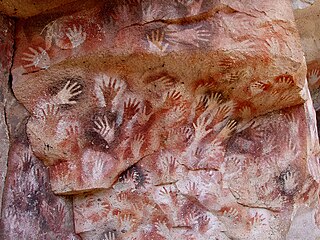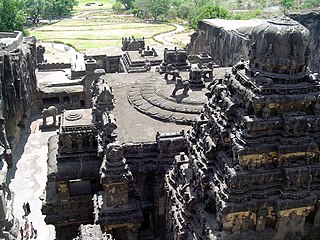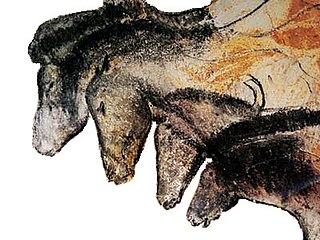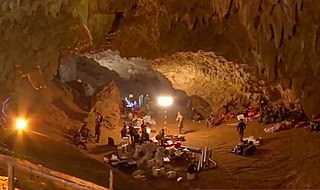Related Research Articles

The Ajanta Caves are approximately 30 rock-cut Buddhist cave monuments which date from the 2nd century BCE to about 480 CE in Aurangabad district of Maharashtra state of India. The caves include paintings and rock-cut sculptures described as among the finest surviving examples of ancient Indian art, particularly expressive paintings that present emotions through gesture, pose and form.

Caving – also known as spelunking in the United States and Canada and potholing in the United Kingdom and Ireland – is the recreational pastime of exploring wild cave systems. In contrast, speleology is the scientific study of caves and the cave environment.

A cave or cavern is a natural void in the ground, specifically a space large enough for a human to enter. Caves often form by the weathering of rock and often extend deep underground. The word cave can also refer to much smaller openings such as sea caves, rock shelters, and grottos, though strictly speaking a cave is exogene, meaning it is deeper than its opening is wide, and a rock shelter is endogene.

Lascaux is a complex of caves near the village of Montignac, in the department of Dordogne in southwestern France. Over 600 parietal wall paintings cover the interior walls and ceilings of the cave. The paintings represent primarily large animals, typical local contemporary fauna that correspond with the fossil record of the Upper Paleolithic in the area. They are the combined effort of many generations and, with continued debate, the age of the paintings is now usually estimated at around 17,000 years. Lascaux was inducted into the UNESCO World Heritage Sites list in 1979, as an element of the Prehistoric Sites and Decorated Caves of the Vézère Valley.

Mammoth Cave National Park is an American national park in west-central Kentucky, encompassing portions of Mammoth Cave, the longest cave system known in the world.

The Dead Sea Scrolls are ancient Jewish religious manuscripts that were found in the Qumran Caves in the Judaean Desert, near Ein Feshkha on the northern shore of the Dead Sea in the West Bank. Scholarly consensus dates these scrolls from the last three centuries BCE and the first century CE. The texts have great historical, religious, and linguistic significance because they include the second-oldest known surviving manuscripts of works later included in the Hebrew Bible canon, along with deuterocanonical and extra-biblical manuscripts which preserve evidence of the diversity of religious thought in late Second Temple Judaism. Almost all of the Dead Sea Scrolls are held by the state of Israel in the Shrine of the Book on the grounds of the Israel Museum, but ownership of the scrolls is disputed by Jordan and Palestine.

Nicholas Edward Cave is an Australian singer, songwriter, author, screenwriter, composer and occasional actor, best known for fronting the rock band Nick Cave and the Bad Seeds. Cave's music is generally characterised by his baritone voice, emotional intensity, a wide variety of influences and lyrical obsessions with death, religion, love and violence.

The Allegory of the cave, or Plato's Cave, is an allegory presented by the Greek philosopher Plato in his work Republic (514a–520a) to compare "the effect of education (παιδεία) and the lack of it on our nature". It is written as a dialogue between Plato's brother Glaucon and his mentor Socrates, narrated by the latter. The allegory is presented after the analogy of the sun (508b–509c) and the analogy of the divided line (509d–511e).

Batu Caves is a limestone hill that has a series of caves and cave temples in Gombak, Selangor, Malaysia. It takes its name from the Malay word batu, meaning 'rock'. The hill was originally known as Kapal Tanggang from the legend of Si Tanggang. The town nearby is named after the Batu Caves limestone formation.

Cave paintings are a type of parietal art, found on the wall or ceilings of caves. The term usually implies prehistoric origin, but cave paintings can also be of recent production: In the Gabarnmung cave of northern Australia, the oldest paintings certainly predate 28,000 years ago, while the most recent ones were made less than a century ago.

A home, or domicile, is a space used as a permanent or semi-permanent residence for an individual, group or family. It is a fully or semi sheltered space and can have both interior and exterior aspects to it. Homes provide sheltered spaces for instance rooms, where domestic activity can be performed such as sleeping, preparing food, eating and hygiene as well as providing spaces for work and leisure such as remote working, studying and playing. Physical forms of homes can be static such as a house or an apartment, mobile such as a houseboat, trailer or yurt or digital such as virtual space. The aspect of ‘home’ can be considered across scales, from the micro scale showcasing the most intimate spaces of the individual dwelling and direct surrounding area to the macro scale of the geographic area such as town, village, city, country or planet.

Cave diving is underwater diving in water-filled caves. It may be done as an extreme sport, a way of exploring flooded caves for scientific investigation, or for the search for and recovery of divers lost while diving for one of these reasons. The equipment used varies depending on the circumstances, and ranges from breath hold to surface supplied, but almost all cave diving is done using scuba equipment, often in specialised configurations with redundancies such as sidemount or backmounted twinset. Recreational cave diving is generally considered to be a type of technical diving due to the lack of a free surface during large parts of the dive, and often involves planned decompression stops.

The Cave of Altamira is a cave complex, located near the historic town of Santillana del Mar in Cantabria, Spain. It is renowned for prehistoric parietal cave art featuring charcoal drawings and polychrome paintings of contemporary local fauna and human hands. The earliest paintings were applied during the Upper Paleolithic, around 36,000 years ago. The site was discovered in 1868 by Modesto Cubillas and subsequently studied by Marcelino Sanz de Sautuola.

Ellora is a UNESCO World Heritage Site located in the Aurangabad district of Maharashtra, India. It is one of the largest rock-cut monastery-temple cave complexes in the world, featuring Hindu, Buddhist and Jain monuments, and artwork, dating from the 600–1000 CE period. Cave 16, in particular, features the largest single monolithic rock excavation in the world, the Kailash temple, a chariot shaped monument dedicated to Lord Shiva. The Kailash temple excavation also features sculptures depicting the gods, goddesses and mythologies found in Vaishnavism, Shaktism as well as relief panels summarizing the two major Hindu Epics.

The Chauvet-Pont-d'Arc Cave in the Ardèche department of southeastern France is a cave that contains some of the best-preserved figurative cave paintings in the world, as well as other evidence of Upper Paleolithic life. It is located near the commune of Vallon-Pont-d'Arc on a limestone cliff above the former bed of the Ardèche River, in the Gorges de l'Ardèche.

Nick Cave and the Bad Seeds are an Australian rock band formed in Melbourne in 1983 by vocalist Nick Cave, multi-instrumentalist Mick Harvey and guitarist-vocalist Blixa Bargeld. The band has featured international personnel throughout its career and presently consists of Cave, violinist and multi-instrumentalist Warren Ellis, bassist Martyn P. Casey, guitarist George Vjestica, keyboardist/percussionist Toby Dammit and drummers Thomas Wydler (Switzerland) and Jim Sclavunos. With their "brutal blues and gothic nightmares" songs, Nick Cave and the Bad Seeds have been considered "one of the most original and celebrated bands of the post-punk and alternative rock eras in the '80s and onward". They have released seventeen studio albums and completed numerous international tours.

A cenote is a natural pit, or sinkhole, resulting from the collapse of limestone bedrock that exposes groundwater. The regional term is specifically associated with the Yucatán Peninsula of Mexico, where cenotes were commonly used for water supplies by the ancient Maya, and occasionally for sacrificial offerings. The term derives from a word used by the low-land Yucatec Maya—tsʼonot—to refer to any location with accessible groundwater.

Antalya Province is located on the Mediterranean coast of south-west Turkey, between the Taurus Mountains and the Mediterranean Sea.

In June and July 2018, a widely publicised cave rescue saved the lives of members of a junior football team who were trapped inside the Tham Luang Nang Non cave in Chiang Rai Province, Thailand. Twelve members of the team, aged eleven to sixteen, and their 25-year-old assistant coach entered the cave on 23 June after football practice. Shortly afterwards, heavy rains partially flooded the cave, blocking their way out.
References
| | This Gibraltar location article is a stub. You can help Wikipedia by expanding it. |